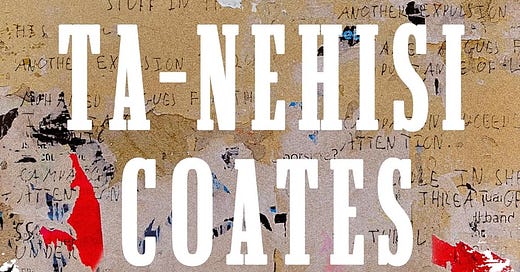“The American sense of reality is dictated by what Americans are trying to avoid,” James Baldwin said in a long-mothballed interview.
Every Ta-Nehisi (TAH-ne-HA-see) Coates book is a major cultural and literary event. He even made a splash by writing a long series of Black Panther comic books – and is working on a script for a new Superman film for DC. His newest book, The Message, has been in the news for his take on the Israel-Palestine-Gaza conflagration. He has won the National Book Award for Nonfiction, been nominated for a Pulitzer, and no less than Toni Morrison compared him to James Baldwin. Let’s not do him the disservice of treating a great book on education, writing, national myth-making and more, as a mere headline-grabber.
In an interview with Trevor Noah (available on YouTube) Coates says, “My purpose is to make room in the frame for people who have been pushed out of it.” His task, in writing this book addressed to his students at Howard University, is to do the opposite of what book bans do: he wants everyone to be heard, especially those who have been routinely silenced. And he wants his students to know how important it is to dig deeper into ALL the stories, the familiar ones as well as the suppressed ones. He is not part of the culture of the “hot take” that is ubiquitous in our media and social media. Hot takes usually confirm what we already think we know. Hot takes reinforce myths, are created and consumed by those who are too impatient to wait for confirmation, much less reflection.
Coates talks, in The Message, about his early love of books and stories; about teachers fighting book bans in North Carolina; about his trip to West Africa, to Senegal, where slave ships departed for the Americas, according to legends; and his trip to Palestine, and to Yad Vashem. In telling these particular, current, controversial stories, his goal is evidently to show his students how hard it is to get beneath the surface; how the secret is in taking the time and effort to find out what people don’t want you to know; and what the finished product of such integrity looks like.
What prophet was ever charged with making their listeners feel good? Teachers, writers, journalists, and parents should help us recognize and deal with reality. All of it. And maybe, with a lot of work, time, and help, improve it.
“It is never enough,” Coates says to students and writers, “for the reader of your words to be convinced. The goal is to haunt….” And he says, “The danger we represent, as writers, is not that we will simply convince their children of a different dogma but that we will convince them that they have the power to form their own.”
Every book lover will recognize the power Coates describes: “But the fact is that, even as I know and teach the power of writing, I still find myself in disbelief when I see that power at work in the real world. Maybe it is the nature of books. Film, music, the theater – all can be experienced amidst the whooping, clapping, and cheering of the crowd. But books work when no one else is looking, mind-melding author and audience, forging an imagined world that only the reader can see.”
In the tradition of Orwell and Baldwin, we are lucky to have such a writer of principled, eloquent prose in our time.





So thrilled that you reviewed this book. Thank you!
excellent review! maybe post it on your Notes so more people know about it?